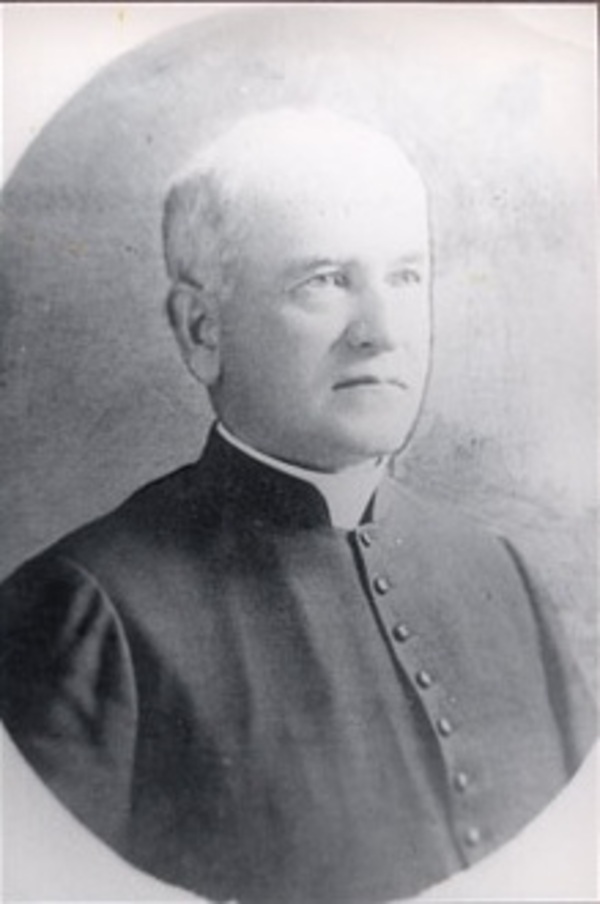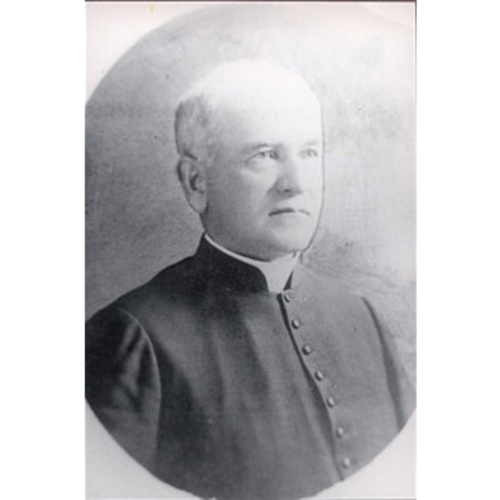
Source: Courtesy of Wikimedia Commons
LEBASTARD, PROSPER (baptized Prosper-Jean-Marie), Roman Catholic priest, Eudist, and educator; b. 14 March 1865 in Saint-Aubin-d’Aubigné, France, son of Prosper Lebastard and Jeanne-Marie Jouland; d. 20 Sept. 1920 in Rennes, France.
Fatherless from the age of five, Prosper Lebastard at twelve was enrolled in the Collège Saint-Martin, which was run by the Eudists in Rennes. A diffident, reserved child, he proved a brilliant student. He entered the Eudist noviciate in Kerlois, near Hennebont, in 1885 and four years later was accepted as a member in Roche-du-Theil. Ordained to the priesthood on 23 May 1891 in Rennes, he went to the Petit Séminaire de Valognes, where he spent two years as study master for the senior pupils. In 1893 he was sent to Nova Scotia to teach philosophy at the Collège Sainte-Anne in Church Point. Two years later he was appointed professor of philosophy at Holy Heart Seminary in Halifax, but he had to leave in 1897 to return to the Collège Sainte-Anne as prefect and first assistant.
The fire that burned down the college on the night of 15–16 Jan. 1899, together with his strained relations with the superior, Gustave Blanche, accounts for Lebastard’s appointment in August 1899 as second superior at the Collège du Sacré-Cœur in Caraquet, N.B. At first he held three positions simultaneously – superior, bursar, and prefect of discipline and studies. He was to guide the destinies of the college with great authority until 1909. His biographer, Father Émile Georges, would observe: “There are some men who seem born to command; and he was one of them . . . [He] was truly master in his house, and an absolute master.”
During his term as superior Lebastard was responsible for enlarging the college, in two projects beginning in 1901 and 1907. Enrolment rose from 19 students to 117 in these years – no mean feat in surroundings with almost no tradition of classical studies. The influence of the college was felt throughout the region. It was a place where people went for live theatre, lectures, meetings, and concerts which everyone agreed were marvellous. It became an important and virtually unique forum for advancing the cause of Acadians and francophones in northern New Brunswick. In 1905 Lebastard played host to the Convention Nationale des Acadiens, which brought together several thousand francophones from the Maritime provinces.
During his ten years at Caraquet, Lebastard was in constant contact with his superiors in France. Every week he wrote them several letters which reveal that he was preoccupied with his mission and its problems. His relations with the founder of the college, the curé Joseph-Théophile Allard, and, in the years up to 1903, with James Rogers*, the Irish bishop of the diocese of Chatham, were sometimes strained. One of the problems he had to deal with was the determination of such Acadians as Pierre-Amand Landry and Pascal Poirier* to have an Acadian bishop, an aspiration the Irish episcopate denied them. Lebastard and the Eudists, who owed their presence in North America to the Irish bishops, were in a delicate position. When in 1900 Thomas Francis Barry was consecrated as coadjutor of the diocese (an appointment denounced by the Acadians), Lebastard noted: “We Eudists are trying to keep in mind that silence is golden.” He did not attend the ceremony, on the pretext that the weather was bad and the railways inefficient. “Our mission,” he observed the following year, “is to avoid any ill-advised act that might compromise [our] work.”
Lebastard was heavily involved in the community of Caraquet and the surrounding area. In 1906 he was partly responsible for the establishment there of a branch of the Banque du Peuple, a Quebec institution. It unfortunately met with little success and was replaced in 1910 by the Banque Provinciale du Canada, which had its head office also in Quebec. The Acadians of northern New Brunswick thus gained their first experience with banking. The Gloucester Navigation Company Limited was founded in 1907 after preliminary meetings were held at the college. The teaching priests at Lebastard’s college were also extremely helpful to the local clergy, organizing retreats, preparing children for their first communion, preaching, and assisting curés. Lebastard and his colleagues were given responsibility for the parish of Saint-Paul in Bas-Caraquet, where they built a church of impressive size, which was completed in 1905.
But it often seemed to the Eudists that they were working in a hostile environment, as a letter written by Lebastard in 1902 shows: “We will always be foreigners here, as will those who come to us from France.” In 1907 he made known his desire to be back in France, but his superior urged him to stay and oversee the building of an addition to the college. He was not able to return to his people until July 1909. His visit was brief, for he came back to Halifax in 1910 and in 1911 was appointed provincial of the Eudists in North America.
During his second stay in Canada, from 1910 to 1920, Lebastard was the driving force behind the founding of a noviciate and scholasticate in Bathurst, on which construction began in 1912. Soon after it opened, however, the structure would be put to another use, for on 30 Dec. 1915 the Collège du Sacré-Coeur burned down, and the students had to shift their studies to Bathurst.
Since the congregation of which he was the provincial favoured rebuilding the college in Bathurst, Lebastard faced opposition from the people of Caraquet and the students, who wanted to keep it in their own village. After considerable bargaining, and with the support of the Acadian clergy in the diocese, including Stanislas-Joseph Doucet, it was decided that the college would be located in Bathurst for the time being. The noviciate and scholasticate would open its doors to the students of Sacré-Cœur in September 1916. Unfortunately, it too burned down on 6 March 1917. Undeterred, Lebastard once again took charge of reconstruction. Permission was granted in 1919 to build the college in Bathurst, but work had still not begun by the summer of 1920, when, having completed his term as provincial, Lebastard left New Brunswick to return to France. In the end, the building intended as a noviciate was to become the college, and classes would resume there in 1921.
Shortly after his arrival in France, Prosper Lebastard entered hospital in Rennes for surgery. On 20 Sept. 1920 he died of a heart attack. His achievements in Canada, or to be more precise, in the Maritimes, were impressive. Unquestionably he was the pioneer of French classical education in northern New Brunswick. He is remembered as a shy, reserved, and authoritarian man who left nothing to chance.
Arch. Départementales, Ille-et-Vilaine (Rennes, France), État civil, Saint-Aubin-d’Aubigné, 14 mars 1865. PANB, MC 318, B, Caraquet, corr. Lebastard (mfm). Dictionnaire biographique du nord-est du Nouveau-Brunswick (6 cahiers parus, [Bertrand; Shippagan, N.-B.], 1983– ), 4e cahier: 32–34. Émile Georges, Le révérend père Prosper Lebastard, eudiste, 1865–1920 (Bathurst, N.-B., 1921). [Georges de La Cotardière], La congrégation de Jésus et Marie (eudistes) au Canada: cinquante ans, 1890–1940; notes et souvenirs (Besançon, France, 1946). Clarence LeBreton, Le collège de Caraquet, 1892–1916 (Hull, Qué., 1991). Marcel Tremblay, 50 ans d’éducation catholique et française en Acadie: Caraquet, 1899–Bathurst, 1949 (Bathurst, 1949), 58–59.
Cite This Article
Clarence LeBreton, “LEBASTARD, PROSPER (baptized Prosper-Jean-Marie),” in Dictionary of Canadian Biography, vol. 14, University of Toronto/Université Laval, 2003–, accessed February 27, 2026, https://www.biographi.ca/en/bio/lebastard_prosper_14E.html.
The citation above shows the format for footnotes and endnotes according to the Chicago manual of style (16th edition). Information to be used in other citation formats:
| Permalink: | https://www.biographi.ca/en/bio/lebastard_prosper_14E.html |
| Author of Article: | Clarence LeBreton |
| Title of Article: | LEBASTARD, PROSPER (baptized Prosper-Jean-Marie) |
| Publication Name: | Dictionary of Canadian Biography, vol. 14 |
| Publisher: | University of Toronto/Université Laval |
| Year of publication: | 1998 |
| Year of revision: | 1998 |
| Access Date: | February 27, 2026 |



